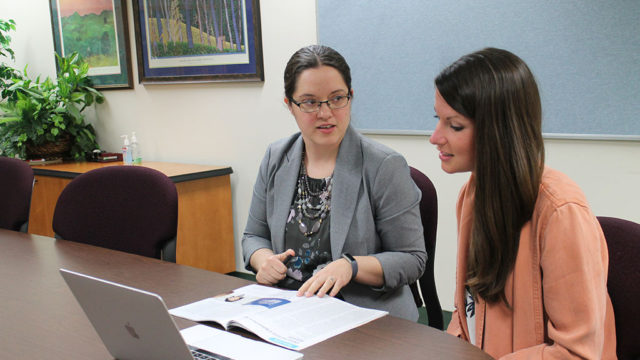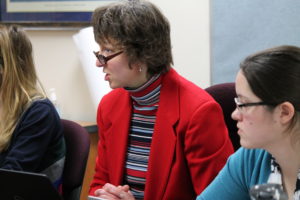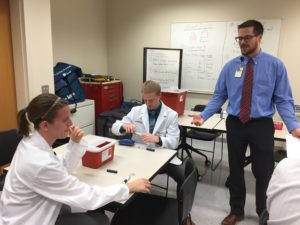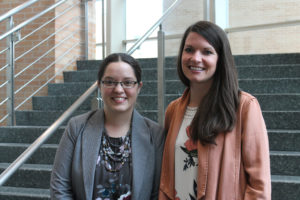
PharmD students publish more than 70 clinical inquiry papers in peer-reviewed journals
By Katie Ginder-Vogel
During her Advanced Pharmacy Practice Experiences (APPE) rotation at the Winnebago Mental Health Institute, fourth-year PharmD student Marklie Munroe evaluated a medication that had recently been approved for the treatment of tardive dyskinesia, a movement disorder caused by psychiatric medications.
Munroe wanted to provide her preceptors, the practicing pharmacists mentoring her during her APPE rotation, with information about the safety and efficacy of the medication, as well as where the medication could fit into practice. Using what she’d learned at the University of Wisconsin–Madison School of Pharmacy, Munroe wrote a clinical inquiry article, a written response to a clinical question that is formatted to be easily digestible, in order to share the results of her analysis.
“My preceptor informed me there was an upcoming issue of the Pharmacy Society of Wisconsin’s journal focusing on mental health and encouraged me to submit the article,” says Munroe. “It was perfect timing.”
“Our curriculum’s focus on teaching students how to translate and communicate research through clinical inquiries is really a unique part of our PharmD program.” –Barry Gidal
Munroe’s peer-reviewed clinical inquiry, “Valbenazine in tardive dyskinesia,” was accepted by JPSW and was published in the mental health issue of the Journal of the Pharmacy Society of Wisconsin in the March/April 2018 issue.
Practicing pharmacists regularly conduct informal clinical inquiries on the job, by reading, analyzing, and summarizing existing resources, then presenting their opinions verbally to healthcare providers in response to their queries. If the inquiry is answering a common or important question, then pharmacists will draft an article for review and submission to a journal, like Munroe did. At the School of Pharmacy, PharmD students practice writing formal clinical inquiry articles to get them used to thinking in a structured, analytical way that supports logical conclusions.
“My clinical inquiry skills are invaluable to my practice,” Nate Menninga (PharmD ’17), now a resident at the William S. Middleton Memorial Veterans Hospital. As a third-year PharmD student, Menninga published a clinical inquiry about smoking cessation options for patients with mental health conditions.
“I strive to provide the best evidence-based medicine for my patients, who are both inpatient and ambulatory,” says Menninga. “And in order to provide this level of care, I must be able to effectively review the available literature, evaluate how the literature applies to patients, and effectively articulate and document my findings to justify my clinical decisions.”

The UW–Madison School of Pharmacy helps its PharmD students develop this crucial skill by teaching them to write evidence-based clinical inquiry review papers throughout their student careers. As a result, the School has an admirable record of producing high-quality evidence-based review papers that earn publication in peer-reviewed journals.
Over the past 12 years, School of Pharmacy students have had more than 70 clinical inquiry papers published in peer-reviewed journals.
“Our curriculum’s focus on teaching students how to translate and communicate research through clinical inquiries is really a unique part of our PharmD program,” says Barry Gidal, professor and chair of the Pharmacy Practice Division. “The students are learning how to really dissect and synthesize information, which is evident not only in their publishing successes but also in their development into excellent clinicians.”
Implementing clinical inquiry in the curriculum
In the mid-1990s, Connie Kraus, professor and vice chair of the Pharmacy Practice Division, and Denise Walbrandt Pigarelli, an associate professor in the Pharmacy Practice Division, implemented evidence-based inquiry into the PharmD curriculum.
“The School’s preceptors suggested making writing assignments more user-friendly,” says Kraus. “We opted to use a clinical inquiry, which is a written response to a critically appraised topic that is formatted in a specific way.”
In their written clinical inquiries, students are expected to provide an evidence-based response to a targeted question, like Munroe’s evaluation of the safety and effectiveness of valbenazine for treating tardive dyskinesia, or Menninga’s recommendations for the best pharmacologic smoking cessation options for patients with mental health conditions. Students need to provide specific information about patient populations and interventions, conduct an effective keyword search in PubMed and International Pharmaceutical Abstracts, and cite reliable sources such as systematic reviews/meta-analyses and clinical studies, to provide a recommendation and explain the strength of their recommendation.

“The ability to effectively search for information, read and interpret information, and convey it succinctly is the essence of critical thinking,” says Kraus. “In school, it is a written assignment to enable us, as teachers, to evaluate the student’s process. In practice, it is more likely to be a verbal process, but fundamentally the same. It gets down to how you present information, how you justify your response, how you express the way you did your search, and how confident you are in your answer.”
Clinical inquiry is in the School of Pharmacy’s DNA. UW–Madison’s Department of Family Medicine and Community Health is a founding member of the Family Physicians Inquiries Network (FPIN), a nationwide network of university family medicine departments, and Kraus has been a section editor for the FPIN journal, Evidence-Based Practice, since 2006 and a senior author since 2014.
“It’s part of the culture, and the School of Pharmacy has been an active player,” says Kraus.
A longitudinal focus
The School of Pharmacy embeds clinical inquiry and critical thinking skills over three years of the PharmD curriculum to help PharmD students develop and deepen that set of skills.
General instruction that helps PharmD students understand what level of evidence is needed for a systematic review, as opposed to a case report or expert opinion, takes place during students’ second year of pharmacy school. Also during their second year, the students take a foundational course in drug literature evaluation that has been a part of the curriculum for decades.
“The School provides an entire course on the interpretation of drug literature taught by experts in drug information and statistics,” says Menninga. “This course provides the foundation for students to understand the literature and critically evaluate studies for flaws.”
“The ability to effectively search for information, read and interpret information, and convey it succinctly is the essence of critical thinking.”
–Connie Kraus
Assistant professor Amanda Margolis, an experiential learning coordinator in the School of Pharmacy’s Pharmacy Practice Division, co-coordinates the drug literature evaluation course.
“In drug literature, we teach students to consider incidence rates and statistical significance, identify flaws, and make sense of them in an article,” says Margolis. “We help them understand how limitations affect the validity of a trial—can you trust those results and apply them to practice?”
Walbrandt Pigarelli says students are building critical thinking skills and processes for solving medication-related problems generally.
“The skills utilized in writing clinical inquiries are essential to our future practice as pharmacists,” says Munroe. “Although we may not be writing a formal paper, we will complete the same assessments, like searching for quality articles, when formulating evidence-based recommendations.”
Clinical inquiries for publication
Kraus coordinates the Introductory Pharmacy Practice Experience (IPPE) program for third-year PharmD students and works with her third-year students to write one clinical inquiry that applies the lessons they learned in their second year to real questions asked by licensed pharmacists in practice. Students, like Menninga, are then invited to work with Kraus to publish their responses.
“During third year, we have a clinical inquiry unit that focuses on necessary skills, such as selecting databases, choosing appropriate search terms, and assessing validity,” explains Munroe. “This series of lectures presented by professors and librarians really set the foundation.”
Topics come from acute care settings, like hospitals, or from community pharmacies, and may be specialized or primary care questions. The students’ preceptors often have patient-related topics or questions about new drugs, like their cost-effectiveness, or how they compare to others in terms of efficacy or toxicity.

“We were taught to help our preceptors,” explains pharmacist Dimmy Sokhal (PharmD ’13), chief clinical officer at Hayat Pharmacy in Milwaukee, who published two clinical inquiries as a resident. “Now, as a preceptor, when I ask students to do it for me, I explain that if I’m calling a prescriber, I should be able to look at the CI (clinical inquiry) and give an evidence-based recommendation right away. For example, if you’re treating diabetes, the CI should cite specific American Diabetes Association guidelines, so the preceptor is prepared to answer questions.”
Kraus says the main thing she’s interested in is a student’s ability to respond to a question in the moment.
“If you are doing a clinical rotation and get involved in problem-solving, you have to be able to find good information quickly, read it, and turn it around to give people good advice,” says Kraus. “We consistently get informal feedback from preceptors and residency directors that our students are good at answering questions and have the confidence to jump in and say, ‘I can help you with that.’”
School of Pharmacy alumni who are now practicing pharmacists agree.
“After writing multiple CIs in school, now, if I have 30 minutes to call a doctor, I can pull an article or review, go through the meta-analysis and figure out where to focus,” says Sokhal.
Kraus, Margolis, and Walbrandt Pigarelli regularly invite students to publish particularly strong papers.
Our students who rotate through family medicine clinics have published many clinical inquiries in Evidence-Based Practice; other students have published clinical inquires in JPSW,” says Kraus. “More recently, our pharmacy residents, several of whom are also UW–Madison School of Pharmacy graduates, have also begun to publish clinical inquiries in American Family Physician and the Journal of Family Practice.”
Gaining a competitive advantage
After students have the opportunity to write a formative review with Kraus in their third year, Walbrandt Pigarelli and Margolis reinforce students’ clinical inquiry skills in their fourth year. Fourth-year student pharmacists do eight clinical rotations and write five or six clinical inquiries.
“Doing assignments for three years produces a certain level of expertise. The rigor of our program has produced incredible results.” –Denise Walbrandt Pigarelli
“There’s a strong pedagogical reason for this method,” says Walbrandt Pigarelli. “Doing assignments for three years produces a certain level of expertise. The rigor of our program has produced incredible results.”
Margolis is involved in several residency programs, and at least two require residents to write a clinical inquiry based on UW–Madison School of Pharmacy’s clinical inquiry method.
“Residents who didn’t go to the UW–Madison School of Pharmacy say they wish they’d had it in pharmacy school,” says Margolis. “The early scaffolding of exposure and experience with clinical inquiry really helps.”
Menninga affirms this and says that requiring students to write multiple clinical inquiries throughout their time in pharmacy school ensures that they gain adequate experience and feedback to help them become an independent practitioner. “These skills will continue to be extremely useful as I continue to care for complex patients,” he says.
Learn more about the School of Pharmacy’s Pharmacy Practice Experiences.